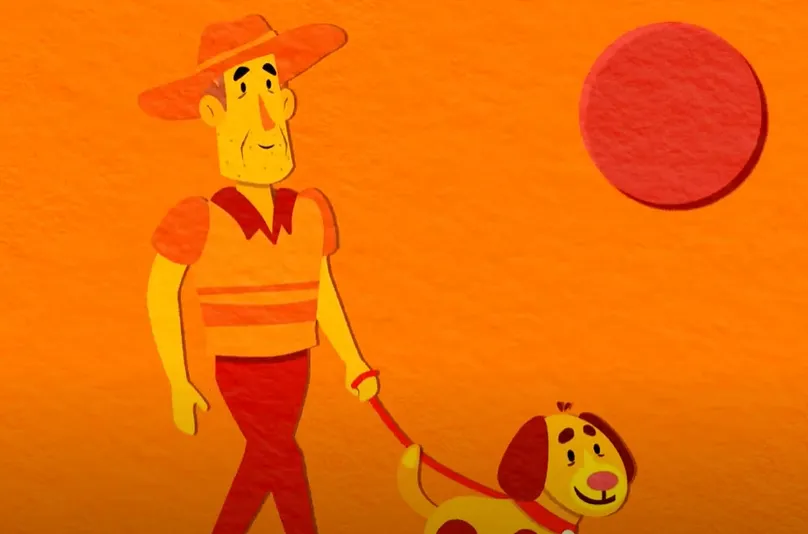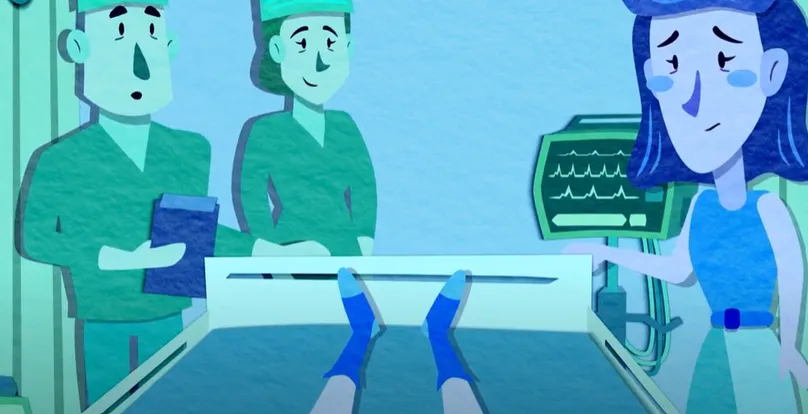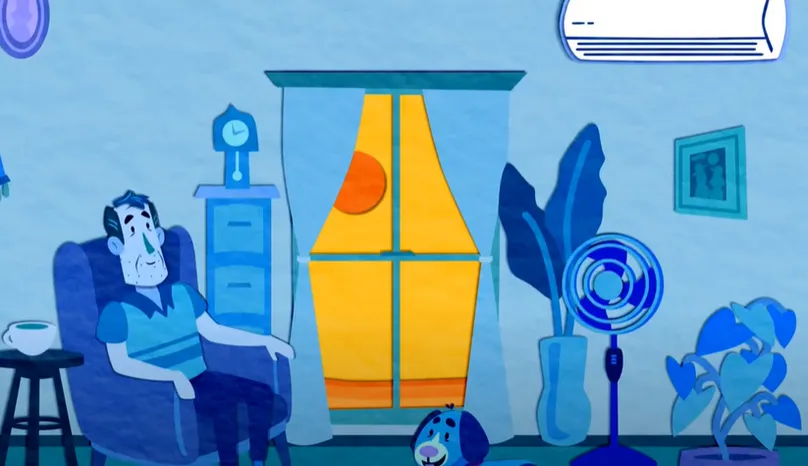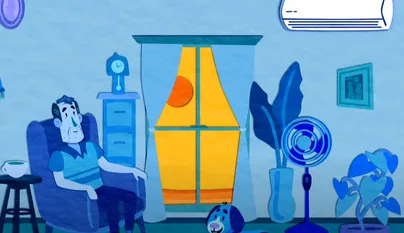Older people in Australia need to take greater care in extreme hot weather.
This article was written in collaboration with experts from Griffith University's Ethos Project.
It’s possible to take charge of your health in the heat. Recognising the dangers of heat, understanding your body’s limits, and taking proactive steps can help you stay safe during the hottest days of the year.
Video: Heat, humidity, and health

Click the play button to hear Claire’s warning about the dangers of hot weather.
Stay safe in the heat
Extreme heat can cause your body a lot of stress. The good news is that heat stress is preventable. Follow these tips to stay safe:
- Stay hydrated. Drink plenty of water, even if you’re not thirsty. If you’re on fluid restrictions, talk with your doctor. Avoid alcohol and caffeine during extreme heatwaves as they contribute to dehydration.
- Cool your body. Take cool showers, soak your hands or feet in water, or apply damp cloths or icepacks to your neck, armpits, or groin. A gentle swim can also be refreshing, just stay hydrated and stick to shaded areas.
- Stay in cool places. Spend time in air-conditioned spaces like libraries, community cooling centres, or shaded areas with flowing air.
- Avoid outdoor exercise. Skip strenuous exercise, like gardening, golf, or tennis, during hot days, even if you’ve tolerated this in the past.
- Dress smart. Wear breathable, loose-fitting fabrics in light colours. Wear wide-brimmed hats if you go outside. Wet your shirt or hat for extra cooling.
- Keep your home cool. Use fans and AC, close curtains during the day, and open windows at night when it’s cooler. Avoid using appliances that generate heat, such as ovens, clothes dryers, or hair dryers.
- Stay connected. If you live alone, check in regularly with friends or family members, and encourage them to do the same for you.
Why is heat a risk to your health?
Heatwaves place a huge amount of stress on your body as it works to cool down. This can make underlying health issues worse, as your organs work hard to cool you down. It can worsen underlying conditions like heart, lung, or kidney diseases and increase the risk of hospitalisation. This is especially the case if you have multiple chronic illnesses.
Your ability to cool down and recognise heat stress decreases as you age. This makes older adults especially vulnerable. Even if you’ve tolerated heat well in the past, it’s important to know your limits and take proactive steps to stay safe.
Who is most at risk?
Your risk of heat stress increases when multiple of the following factors combine:
- Being 65 or older
- A heat index of 33C or higher (A heat index is a figure which considers how both the outdoor temperature and humidity combine to make you feel)
- Chronic health conditions such as high blood pressure, diabetes, or obesity
- Some medications can increase heat sensitivity (talk to your doctor or pharmacist)
- Outdoor activity, such as gardening or exercise
- Living alone, as it’s harder to keep track of your health and take cooling measures without support
- Homes without air-conditioning (AC) or proper insulation, as they hold more heat
- Living in isolated or low socio-economic areas, where help or resources may be limited
Video: Martin's story

Press the play button to hear Martin's story after being hospitalised for heat exhaustion.
Recognising the signs of heat stress
Early signs of heat stress can include:
- Heavy sweating
- Thirst
- Discomfort
- Headache
- Reduced alertness
- Irritability
These are warning signs that your body is struggling to cope with the heat. If untreated, heat stress can progress into more severe conditions like heat exhaustion or heatstroke, which can be life-threatening.
What to do if you feel heat stress
You can take these steps to cool down:
- Get to a cool, shaded place and lie down
- Wet your skin with cool damp cloth, mist, or cool water
- If lying down, you can submerge your hands and feet in cool water
- Drink plenty of water slowly
- Use icepacks (wrapped to protect your skin) under the armpits, groin, or sides of the neck to cool your body quickly
Stop heat stress before it becomes an emergency
If heat stress isn’t managed, it can lead to heat exhaustion, where the body loses too much water and salt through sweating. Symptoms can include:
- Fatigue
- Nausea
- Anxiety
- Poor coordination
Important safety notice
Heat exhaustion can escalate into heatstroke. This is a life-threatening emergency where the body’s temperature rises above 40C.
Symptoms can include:
- Confusion
- Unconsciousness
- Inability to drink fluids
If this happens, or if heat exhaustion persists longer than an hour, call triple zero (000) immediately.
Learn more about the signs, symptoms, and treatment of heat related illness.
Video: Spread awareness, take action

Press the play button to watch this video from Griffith University's ETHOs Team about how to get heatwave ready and stay safe during hot weather.
Many older people in Australia don’t recognise heatwaves as a serious risk to their health. By being aware of the dangers and taking simple steps, you can protect yourself and reduce the impact of extreme heat.
What you can do now
- Share this article with friends or family to spread awareness about heat safety.
- Look out for our next article in this series, Keeping Your House Cool on a Budget, for tips on improving your home’s cooling efficiency.
- Learn more about protecting yourself from extreme heat at Griffith University’s Ethos Project
Understanding how heat affects your body, recognising the early signs of heat stress, and adopting preventive measures will help you stay safe and healthy this summer. Take charge of your health today and enjoy a cooler, safer summer.
Get in touch with LiveUp
Everyone is different so some of these tips may work better for you than others.
If you need more healthy ageing information, take the LiveUp quiz or get in touch with one of our helpful team on 1800 951 971.
References
Mayo Clinic. (2023, April). Heat exhaustion - Symptoms and causes. https://www.mayoclinic.org/diseases-conditions/heat-exhaustion/symptoms-causes/syc-20373250
Meade, R. D., Notley, S. R., Kirby, N. V., & Kenny, G. P. (2024). A critical review of the effectiveness of electric fans as a personal cooling intervention in hot weather and heatwaves. The Lancet Planetary Health, 8(4), e256–e269. https://www.thelancet.com/journals/lanplh/article/PIIS2542-5196(24)00030-5/fulltext
NSW Health. (2024, December). Who is at greater risk of heat-related health problems. https://www.health.nsw.gov.au/environment/beattheheat/Pages/people-most-at-risk.aspx
World Health Organization. (2024, May). Climate change, heat and health. https://www.who.int/news-room/fact-sheets/detail/climate-change-heat-and-health
Xu, Z., Yi, W., Bach, A., Tong, S., Ebi, K. L., Su, H., Cheng, J., & Rutherford, S. (2024). Multimorbidity and emergency hospitalisations during hot weather: A multicountry, multicity study. The Lancet Planetary Health, 8(5), e350–e358. https://www.thelancet.com/journals/ebiom/article/PIIS2352-3964(24)00183-X/fulltext
LiveUp provides free information to help you make informed decisions about your health. This information is for general and educational purposes only, is not intended to provide a comprehensive guide, and does not replace medical advice. Everyone is different, so some of these tips may work better for you than others. You should use your own judgment and seek medical advice when applying this information to yourself, to determine if it is suitable in your circumstances. Your use of, or reliance on, this information is solely at your own risk. Independent Living Assessment Incorporated is not responsible or liable for any injury, loss, or damage caused as a result of your use of, or reliance on, this information.
Download and print this article:
You can print out the PDF and stick it to your fridge or file away the tips to revisit at a later time.

Read more Maintain my health articles
Did you enjoy this article? You may also like reading similar healthy ageing articles.
See all Maintain my health articles

